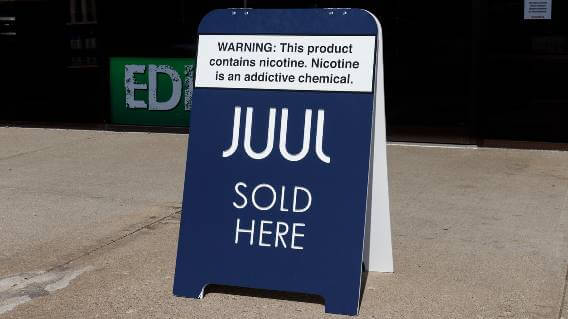
While denying any wrongdoing, electronic cigarette maker Juul Labs Inc. agreed to pay $438.5 million in a multistate settlement to resolve allegations that its marketing of high-nicotine vaping products was aimed at underage users.
The deal includes 33 states and Puerto Rico and has numerous restrictions on how Juul can market its products in the future, many of which already have been instituted.
Despite the resolution, the company is still facing nine more e-cigarette lawsuits involving other states and thousands of personal lawsuits brought on behalf of individuals who say they became addicted to the products being sold.
Connecticut Attorney General William Tong announced the settlement terms June 7, which resolved a two-year investigation into the manufacturer’s marketing and sales practices.
“We think this will go a long way in stemming the flow of youth vaping,” Tong said. “It continues to be a huge problem, but we have essentially taken a huge chunk out of what was once a market leader, and by their conduct, a major offender.”
The settlement number is roughly 25% of Juul’s total sales of $1.9 billion in the U.S. in 2021. The Juul settlement will be paid out over a six-to-10-year period.
‘Predatory Marketing’ to Teens Prompted Investigations
The sale to teenagers of e-cigarettes skyrocketed when Juul first launched its promotions in 2015, leading the U.S. Food and Drug Administration to declare an “epidemic” of underage vaping.
Tong said Tuesday that Juul had engaged in “predatory marketing.”
School administrators throughout the country have blamed the teen vaping epidemic on Juul’s early marketing, which included free sample parties, slick social media, sleek vaporizers, young models in advertising and fruity flavors that appealed to youth.
Juul became the market leader in 2018, drawing considerable criticism from regulators. The FDA announced a ban on the product earlier this year, but the Juul ban was suspended quickly when Juul won a court appeal.
Juul has consistently accused the FDA of holding it to a higher standard than other e-cigarette manufacturers.
In 2021, e-cigarette brand Puff Bar replaced Juul as the most popular brand among teenagers.
Under considerable pressure from regulators and the threat of lawsuits, Juul started changing its marketing in 2019, the same year the minimum age for purchasing tobacco products was raised from 18 to 21.
Since that time, youth use of e-cigarettes has declined.
Juul Settlement Agreement Outlines Rules
A Juul spokesperson said the settlement announced June 7 was part of an effort to resolve issues from the past. Juul already had paid $87 million in settlements with four other states in the past 12 months.
“We remain focused on our future as we fulfill our mission to transition adult smokers away from cigarettes – the number one cause of preventable death – while combating underage use,” the company said in a statement.
According to investigators, Juul’s original marketing was misleading and did not clearly disclose that its product contained nicotine, then implied it contained a lower amount of nicotine than it actually did.
The company also misrepresented its product as a smoking cessation device, despite having no approval from the FDA to make such a claim.
It will be another three to four weeks before the settlement is finalized. At this point, however, Juul has agreed to refrain from:
- Funding education programs
- Marketing to youth
- Using cartoons
- Selling any flavors not approved by the FDA
- Using sponsorship/naming rights
- Providing free samples
- Using social media advertising other than testimonials from individuals over 35
- Advertising in outlets unless 85% of the audience is adults
The agreement also includes sales and distribution restrictions, including where the product can be displayed and accessed in stores.
“We are under no illusions, and cannot claim that this will stop youth vaping,” Tong said. “The full public health ramifications of this misconduct are yet unknown.”